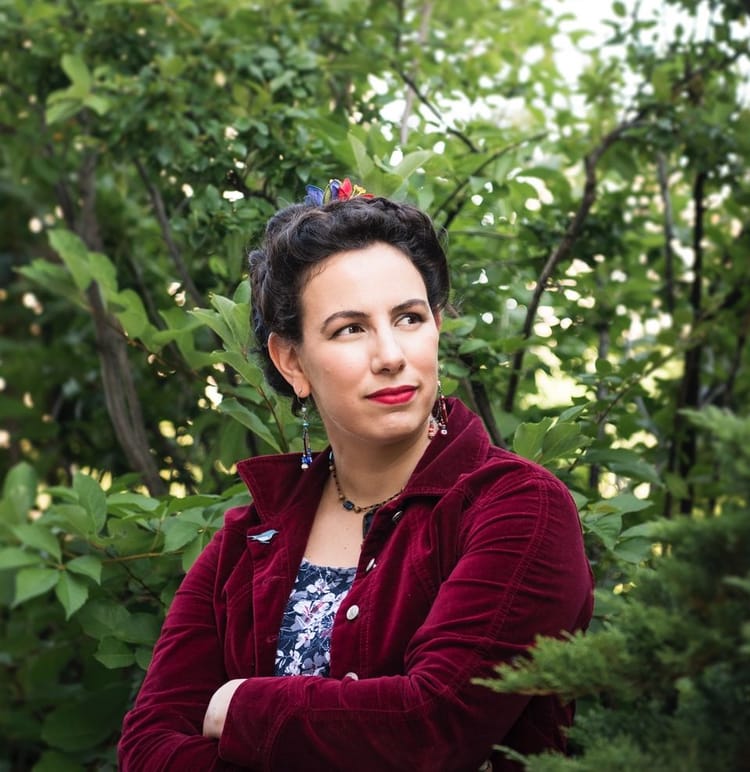Finding Solace in Three Greasy Tortillas | Tacos de Huevos Estrellados

Héctor González (he/they) is a nonbinary Mexican speculative fiction writer living in Austin, TX. They often explore traditional Mexican cooking as gateway narratives on his Instagram @mexicanity as Abuelite Héctor.
This is a story about three Héctores (1).
The first Héctor is Hectorito (he/him). He is ten years old and a child. Hectorito is piecing things together. Three years earlier, he consoled his crying mother on the night his dad asked for a divorce. Alicia, Hectorito’s mother, asked to be held, and the child did it without knowing why. Alicia will later deny this happened.
Ten-year-old Hectorito wakes up and gets ready for school. He mostly goes to his classes because Hectorito knows Alicia will make him do chores if he stays. He isn’t a fan of that. Hectorito is starting to sink into middle children's sad well of inattention. The younger sibling needs the care and attention while the oldest is making waves on their own. Some call this the sandwich sibling syndrome.
Alicia is in full arriera mode, rushing the kids to school. The kids in this memory are Hectorito and his sister Martha. She is two years older than him and starting to be bolder and more rebellious (2). Some say it is her Scorpio nature but Martha always had a wild explorer streak. If Martha doesn’t want something, she will be adamant about it. This morning, she will show this with eggs.
Alicia lightly cooks three corn tortillas in grease and tops them with two eggs, sunny side up. The yolks tremble when put in front of him. Hectorito is elated as this is one of his favorite things to eat. There is something about how Alicia makes these eggs that feels extra special. His mom cooks many things great but these eggs have something unique he hasn’t figured out. Hectorito feels happier every time he eats these. Martha gets the same breakfast.
“I don’t want eggs,” she whines. It is a complaint and a rebellion.
“Esto no es un restaurante. Muérete de hambre si quieres.” Alicia isn’t having it with her daughter’s pickiness. Martha can starve for all she cares. Alicia can’t allow delays, as the neighbor taking them to school will be here soon. In her book, a mother who can’t control their children is a terrible one.
Hectorito devours the eggs and runs to catch his ride to school. His sister dashes too, leaving the breakfast behind, uneaten. Hectorito is seated in the neighbor’s car when he recalls he forgot his lunch, a torta de jamón, and runs back to the kitchen.
Alicia is standing before Martha’s untouched plate of eggs, crying. Hectorito wasn’t supposed to see this. His mother notices her son and reacts with anger. She screams, asking why he isn’t going to school. Hectorito escapes, scared of getting el cinturón. He won’t have lunch today, but this memory, of the eggs, the struggle, and the pain, will stay.
꘏
The second iteration is Héctor (he/him). He is 30 years old and fresh from the border. He and Alicia live in Santa Ana, California, with Elena, who is Alicia’s mother and Héctor’s abuela. He calls her AbuElena from time to time. She is 76 years old.
Elena came to the USA in 1958 when she was 30 years old. She wanted to earn enough money to buy her children back from Grandpa David’s sisters. That is a story for another day.
Héctor never “knew” his Abuela before this. Elena lived away and he only interacted with her when she visited, once a year, during the Christmas season. He thought before that AbuElena visited at that time because she enjoyed the Navidad in México but he was wrong. She worked cleaning houses; during that time, her clients traveled and didn’t need her services. This is one of the many things Héctor will learn about his family, thanks to AbuElena.
Alicia and Héctor are helping Elena. She fell from her bed at the start of the year and badly hurt her arm. Elena’s doctor, the one assigned to her through Medicare, says she is fine and approved only two physical therapy sessions (3).
Elena was still hurting after that, so she called Alicia, who lived in México, to come to California and give her a hand. She asked if Héctor could come too. At the end of 2003, he and all his coworkers were laid off from their job at a computer sciences institute. Héctor also broke off an engagement six months prior. He is still grieving both losses but hasn’t learned how to do this yet. He also hasn’t questioned why he is needed for this trip. Héctor plans to help his Abuela while looking for freelance computer tech work. He expects to make enough money to start another business back in México. Héctor hopes he will be in California for only six months, tops.
Héctor helps clean the house, sorting the messy garage, and rehoming and repotting the multiple orchids surrounding AbuElena’s home. Her children know she loves flowers and the Orchidaceae makes a popular gift. AbuElena has over 50 of these, either dormant or blooming.
Alicia is making breakfast for Elena and Héctor. Alicia and Elena haven’t had a lot of Mother and Daughter time together. When Elena left for the USA in 1958, Alicia was ten. Grandpa David's sisters never told her why her mother left. They told young Alicia that Elena abandoned her because she wasn’t pretty enough, like her sister Rosa.
Sister Rosa got pampered by the aunts while Alicia had to help with the house chores. She cleaned daily, woke up early in the morning to take the corn to the mill for masa, and then came back with yesterday’s batch, ready for tortillas. If Alicia did all her chores, she was rewarded with attending school. She rarely saw her dad. Alicia will tell Héctor how she fell asleep on her cot, hugging a very shitty doll that smelled like urine, her only toy, while crying. She cried herself to sleep regularly.
Now, Alicia lightly fries three corn tortillas on her mother’s cazuela, then puts these on a plate, topped with two sunny side eggs. The yolks aren’t as vibrantly colored as the ones back in México. Héctor brings out the salsa Alicia made yesterday (4). It is spicy, vibrant, piquant. The kind that hurts a little but the beautiful flavor makes you crave it repeatedly, with a perfect balance between pain and spice.
This is one of Héctor’s favorite dishes. It is one of his comfort foods. He relishes it and is excited about it. Héctor is 30, the same age as his grandmother when she arrived in the USA. The parallels haven’t sunk in yet. He’s timid about living in Santa Ana. Even crossing a street feels daunting. Héctor might speak a semblance of the English language but feels very unprepared for this journey. The food on the plate makes the transition easier. Familiarity leads to easiness, which might lead to comfort.
Elena looks puzzled at the plate and asks, “¿Cómo comes esto?”
Héctor teaches his grandma how to do it. He centers one of the eggs over the topmost tortilla and puts salsa on it. He grabs the opposite ends of the tortilla, folding it like a taco, with the egg perfectly cradled inside.
Héctor takes a bite on one end, piercing the yolk. It explodes in his mouth; the pristine flavor explodes lively into his mouth. The salsa adds a touch of heat, and the lightly fried tortilla crunches under his teeth. A dumpling of heavenly flavors erupts in his mouth.
The rest of the yolk oozes out of the other side of the taco. Héctor directs this cascade of golden nectar on top of the other egg (5). He then grabs the second tortilla and folds it like a taco again, directing the flowing yolk on top of the third tortilla. The last taco is full of leftover flavors: pieces of egg, yolk splashes, and bits of salsa.
By the end, the fingers are slightly greasy from the tortillas and bathed by the other ingredients. Para chuparse los dedos is the ultimate compliment for a chef. With these eggs, it is a requirement.
“No me gusta,” Elena complains. She explains how these are hard to eat with her arm as it is now. Elena doesn’t say it but she’s displeased. “A ver, tráeme un par de tortillas.” Alicia obeys, putting two tortillas over the gas stove’s flame. She lets these get a little charred, as Elena likes them. She breaks a piece of the tortilla and uses it like a spoon, scooping the yolk and salsa.
“¡Uy! Esta ni pica.” Elena retorts this time. Alicia quickly replies, promising a spicier salsa later that day “con los chiles que te gustan, mami.” Elena eats while a painful feeling envelops the kitchen.
Héctor asks his mother if she’s having breakfast with them. “No tengo hambre.” He has heard this tone from her before. It is a sound of shrinking. Resignation. Sadness.
Elena finishes her eggs and leaves the greasy tortillas underneath, unharmed. Héctor offers to take care of the dishes while Elena and Alicia go to the backyard garden and enjoy the sunny California weather. The balance between being a guest and a helper needs to be threaded carefully.
Elena and Alicia leave through the back door while Héctor picks up the dishes. He furtively scoops the leftover tortillas, puts salsa on top, and takes a hungry bite. Héctor thinks the condiment is great. He peers through the window and watches two old women walk together, one grabbing another’s arm, hungry for affection.
꘏
The last Héctor from this tale is Abuelite Héctor (they/them). They are feeling their oats, as people say in the south. Abuelite Héctor recalls how they initially thought of staying only six months in the USA. It’s been 18 years. They are 48 years old. Their non-binary abueliteness is on full display this morning. A bright pink apron with twin chickens decorating the front pockets covers them from splatter and potential accidents. They recently had a very refreshing pedicure with delightful cosmic green toe polish. A playlist comprised of Julieta Venegas, Rocio Durcal, Juán Gabriel, and other iconic singers of their youth inspires Héctor’s cooking today.
They turn the gas stove on and put their oddly-shaped comal over it. AbuHéctor (an alternate nickname) uncovers a bowl with blue masa inside. They prepared it earlier and it is ready for action. AbuHéctor grabs a handful of the blue material and starts shaping it like a disk. They pull out a brightly colored tortilla press and put the masa inside, sandwiched between two pieces of plastic. AbuHéctor closes the tool and presses once, then opens it, turns the masa over, and presses again. The masa is now a thin, raw blue corn tortilla.
Héctor touches the comal with their hand for a fraction of a second. Instinct tells them it is hot enough. They grab the uncooked tortilla from the press, carefully peeling it from the plastic, then tenderly depositing it on the comal.
Héctor moves to the press again. They don't need to watch over the cooking tortilla. It’ll be ready soon. When Héctor finishes pressing the new one, the tortilla on the comal has successfully cooked on one side. They deftly grab the hot tortilla and turn it over. A few seconds later, it starts to puff. Héctor smiles as they turn the tortilla one final time. “I still got it” crosses their mind.
Héctor grabs the tortilla and lets it rest inside the folds of their tortilla towel. They repeat this short song and dance until all the blue masa is gone. Fourteen tortillas are resting in the warm towel but only six are needed this morning.
The comal is removed from the fire and a pan takes its place over the dancing blue gas flames. AbuHéctor adds a splash of oil to the pan, and waits until it starts to shimmer before they deposit the first tortilla. The collaboration of the corn and the fat produces a sound and smell AbuHéctor loves.
They don’t let the tortilla get too crispy, turning it around and then putting it on a plate. The tortilla keeps its pliability but now has a texture, a crunch that makes it better. They repeat the process five more times, putting three tortillas on each plate. This Venn diagram gets topped with two sunny side eggs, courtesy of a friend’s chickens, each with a bright yolk.
The table is set to impress: two salsas (verde y roja), crumbled queso fresco, a sliced avocado, pickled red onions, Mexican crema, and a French press with freshly ground coffee.
Abuelite Héctor serves the dish to their fiancée. Lesley knows how to eat it. Each bite by them is followed by a compliment (“So good!”), an expression of their enjoyment (“YUMMY!”), or a happy chair dance. Abuelite savors these moments. Feeding others and seeing their enjoyment is always fulfilling.
There is a call to their mom that evening. Alicia’s memory is failing her. A doctor checked for Alzheimers but the specialist stated she doesn’t have that. Alicia sometimes forgets the days of the week or calls Héctor “David,” the name of the youngest of Abuelite’s siblings.
Abuelite Héctor especially tells Alicia about their life in Austin. The matriarch doesn’t go out a lot. It is not safe for her. Alicia’s had multiple falls but hasn’t broken a bone. “Es la gracia de Diós, mijo,” is her reply, trying to reassure her child how God has her back.
They used to read books together. Her offspring would find a story in Spanish for the mother. The book would be read patiently over the phone, giving proper voices to each character. However, Alicia needs help recalling the previous chapters or events. Abuelite Héctor read an article about how talking to someone about their past can help people with memory issues. Unfortunately, even their times together seemed to elude their mother. These small heartbreaks are more common these days.
“¿Mami, te acuerdas de…?” is a common way to start conversations. Sadly, Alicia needed a lot of context and details to remember things these days. Abuelite Héctor suspects their mother sometimes said she remembered so as not to make her child sad. Sisyphus’s rock stayed the same size but in Abuelite Héctor’s case, it shrank and shrank, leaking precious memories.
“¿Qué crees que cociné hoy?” is another good topic for them. Abuelite Héctor’s love for cooking comes from an undeniable source. Cooking together was bonding time for the always-rushed mom. Hectorito, Héctor, and many other versions sought to get close to their mother while in the kitchen. At times, it was about learning how to do things. Most of the time, having one-on-one time with someone you hoped gave you the care you needed. It sometimes happened but not as often as Hectorito hoped.
This call already feels heavy. Alicia feels tired. She doesn’t play along with their food guessing game. She just replies, “No se. Dime.”
“Tacos de huevos estrellados.” This is said with fake enthusiasm, trying to improve the mood.
“¡Ay! ¡Qué rico!” Alicia perks up. “¿Sabes a quién le gustaban los huevos así? A tu abuelo David.” Héctor is surprised. They don’t know much about their mother’s relationship with their grandpa. They knew David was an awful parent. They didn’t know he had the same favorite dish.
Alicia tells Héctor how her father came some weekends to the house and her tías, David’s sisters, pampered him. Alicia didn’t know where her father was at the time (6).
Alicia is recalling how she was taught by her tías how David liked the dish. The tortillas must be crunchy yet soft, the eggs tender but with crispy char on the edges. He didn’t like salt on them, only salsa roja, bien picante.
David would come home and barely acknowledge any of his other five children. However, he would pay attention to Alicia. She would make the huevos precisely as he liked these. Alicia would bring the plate to her father. He would notice the girl for a moment. Alicia asked, “¿Te gustaron, papi?” hungry for praise. David nodded and made a sound that she would take as a yes. He did not thank her. David never showed affection to his children, no hugs, no kisses. He also never kissed Elena.
Héctor hears how their mother’s voice brightens, recalling how Héctor’s shitty grandpa barely showed any love to young Alicia. But that nod was enough for young Alicia.
They talk for a few more minutes, but her voice never shines as much as when recalling her father and the huevos. They start saying their goodbyes. Abuelite Héctor goes first.
“Cuidate. Te quiero mucho.”
“Yo también te quiero mucho, David. Besos.” The line goes dead. Alicia calls Héctor by their younger brother’s name. Or maybe her father’s. For Abuelite Héctor’s well-being, they never ask. It is better this way.
Footnotes
- Héctores is the proper plural for more than one Héctor. Not Héctors. That is more like the name of a taco truck or a hole-in-the-wall bar.
- This is very easy. Hectorito was not rebellious at all.
- Elena had to wait one year to choose another doctor through her Medicare and get a second opinion on her arm. She had a fractured arm after her fall. It managed to heal due to not using it a lot and staying put.
- Remember, salsas mature overnight.
- A very morbid baptism if you think about it.
- AbuElena will tell them how David was probably hanging with his friends drinking or at the whorehouse. David bought a house for his favorite prostitute before getting one for his family. He barely visited their children, submitting Elena to a life of abuse from him and his family. She left him because of these and many other mistreatments.
Héctor’s Tacos de Huevos Estrellados

This is a recipe for perfectly-composed breakfast tacos made with sunny-side-up eggs. Prepared as written, it produces one satisfying plate.
Get the Recipe: PDF, Google Doc
If you’d like to own the Personal Canons Cookbook ebook, which collects all these essays and recipes in easy-to-reference, clickable format—plus loads of bonus recipes from me!—join the Stone Soup Supper Club. The ebook is free for subscribers, who will get the download link in their inboxes in the first Supper Club email of 2024!
Remember: Care for yourself and the people around you. Believe that the world can be better than it is now. Never give up.
—Gailey






Member discussion